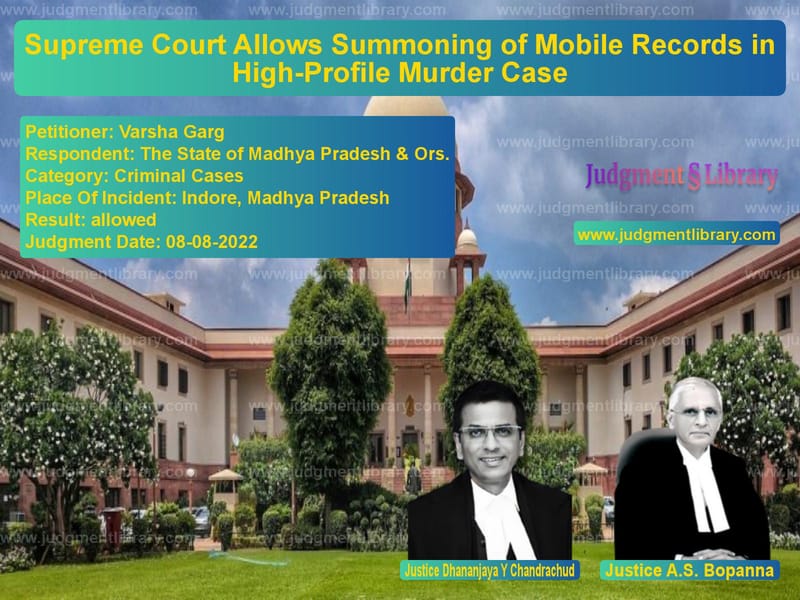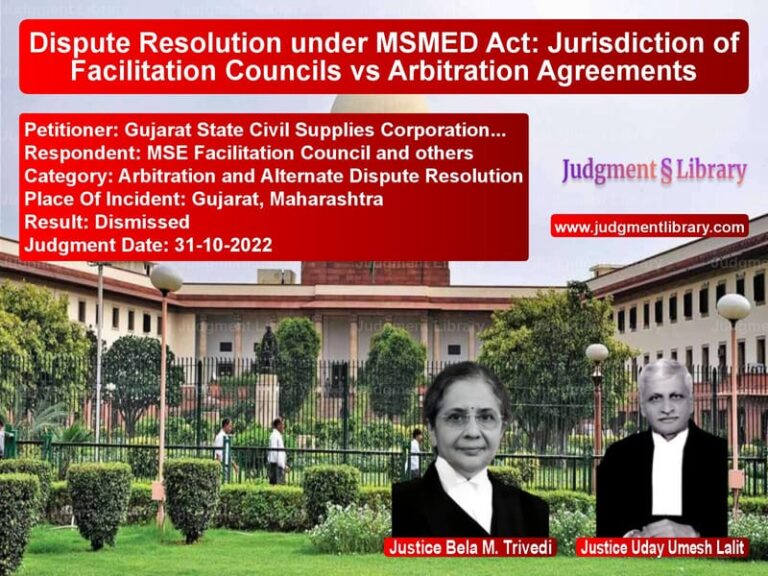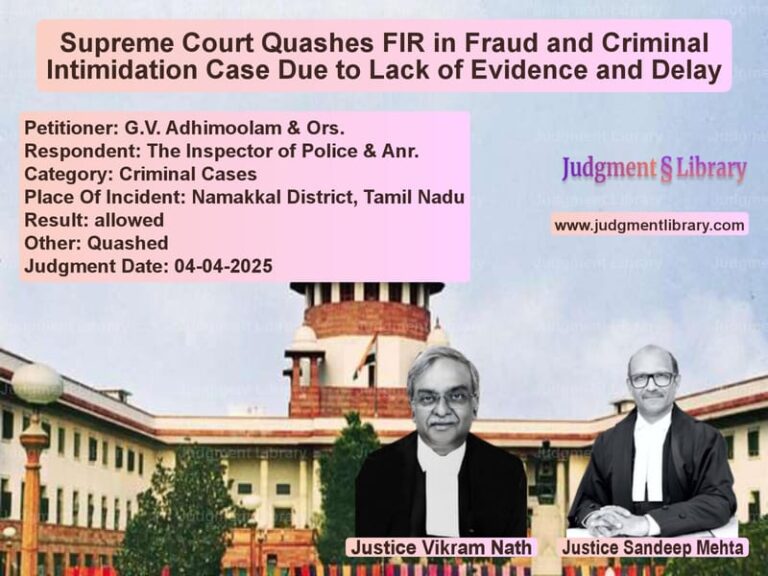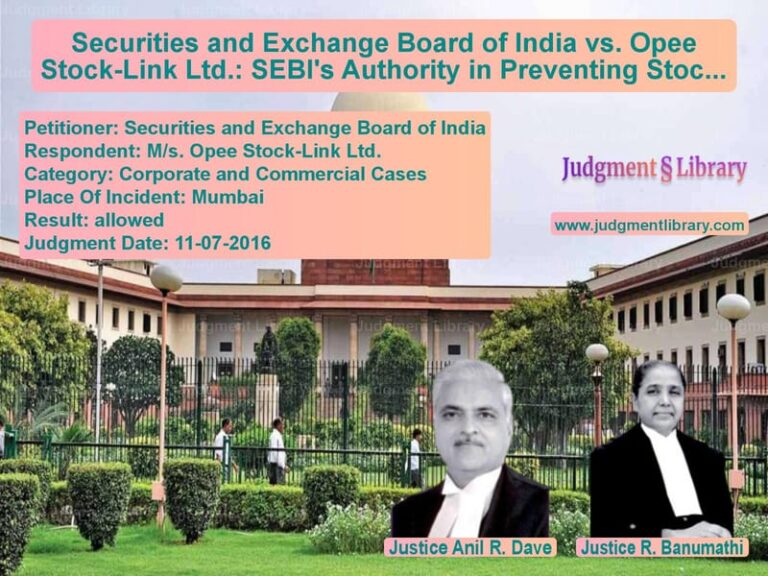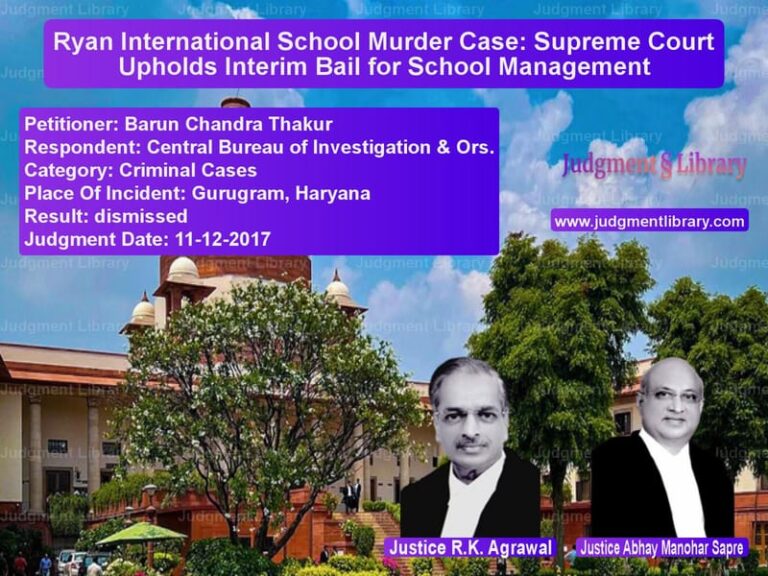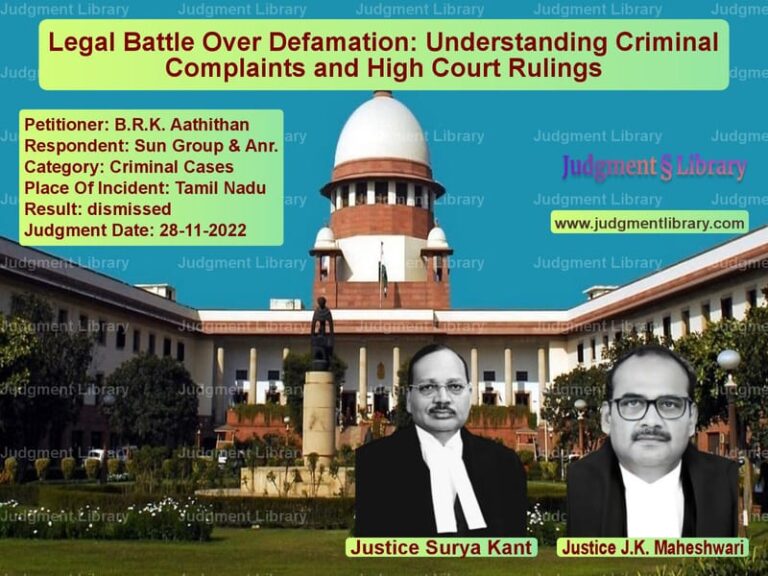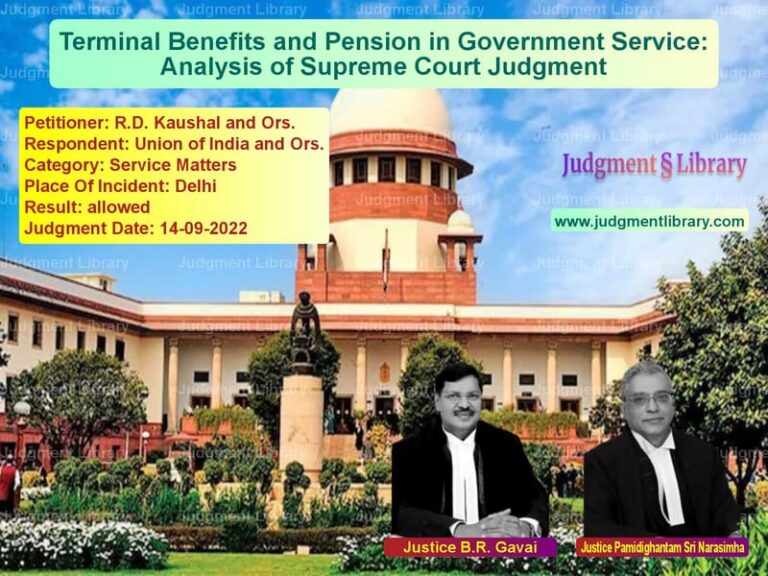Supreme Court Allows Summoning of Mobile Records in High-Profile Murder Case
The Supreme Court of India, in Varsha Garg v. The State of Madhya Pradesh & Ors., addressed a crucial issue concerning the summoning of mobile records and decoding registers in a high-profile murder trial. The judgment, delivered by Dr. Dhananjaya Y Chandrachud and A.S. Bopanna, overturned the decisions of the High Court and the Trial Court, thereby reinforcing the significance of fair trial principles and the pursuit of truth in criminal proceedings.
Background of the Case
The case revolved around the murder of an advocate outside his office at approximately 11:30 PM on November 18, 2015. The First Information Report (FIR No. 734 of 2015) was lodged the following day at Police Station Mhow, District Indore, under Section 302 read with Section 34 of the Indian Penal Code (IPC). The police arrested five individuals – Vikas, Sawan, Mangilal, Suresh, and Raju – and filed a charge sheet on February 15, 2016, followed by a supplementary charge sheet on November 20, 2016.
Petitioner’s (Varsha Garg’s) Arguments
Varsha Garg, the wife of the deceased advocate, filed an application under Section 311 of the Code of Criminal Procedure (CrPC), seeking to summon nodal officers of cellular companies along with their decoding registers to verify the mobile locations of the accused persons. She argued:
- The mobile records were crucial to establishing the presence of the accused at the crime scene.
- The prosecution had previously failed to collect and submit the decoding registers.
- The trial court wrongly closed the prosecution’s evidence without considering the importance of the mobile records.
- The High Court erred in rejecting her application under Section 482 of the CrPC.
Respondent’s (State of Madhya Pradesh and Accused’s) Arguments
The respondents, including the accused and the State of Madhya Pradesh, presented the following counterarguments:
- The application under Section 311 was filed at a belated stage after the prosecution’s evidence was closed.
- The nodal officers had already been examined in 2017-2018.
- Decoding registers were not part of the original investigation and were not included in the case diary.
- The accused had been in custody for over 6.5 years, and further delay would infringe upon their right to a speedy trial under Article 21 of the Constitution.
Supreme Court’s Key Observations
The Supreme Court provided a detailed analysis of the case and made several key observations:
- Role of Decoding Registers: The Court noted that decoding registers were essential for matching mobile numbers with specific locations.
- Relevance Under Section 311 CrPC: The Court emphasized that trial courts have broad powers under Section 311 to summon witnesses and recall evidence when it is “essential to the just decision of the case.”
- Distinction Between Sections 311 and 91 CrPC: Section 311 allows the recall of witnesses, while Section 91 empowers the court to summon documents. Both provisions were relevant in this case.
- Impact on the Accused: The Court dismissed the argument that summoning mobile records would unduly prejudice the accused, as the evidence had been previously referenced in the charge sheet.
- Prosecution’s Oversight: The Court held that any lapse by the prosecution in collecting crucial evidence should not become a ground for denying justice.
Supreme Court’s Judgment
The Supreme Court allowed the appeal and set aside the orders of the High Court and the Trial Court. The key directions included:
- The prosecution’s application under Section 311 CrPC was granted, allowing the summoning of the decoding registers.
- The nodal officers of the cellular companies were directed to testify regarding mobile locations.
- The Trial Court was instructed to conclude the trial by October 31, 2022.
- Interim bail for one of the accused, Mangilal Thakur, was extended until the trial’s completion.
Impact of the Judgment
This ruling has significant implications for criminal trials in India:
- Strengthening Fair Trials: The judgment reinforces the principle that courts must proactively summon evidence necessary for the pursuit of justice.
- Expanding the Scope of Section 311 CrPC: The ruling clarifies that courts can recall witnesses and summon documents even after the prosecution has closed its evidence.
- Prevention of Miscarriage of Justice: The decision ensures that critical evidence, such as mobile records, is not overlooked due to procedural delays or oversight by the prosecution.
- Balancing Speedy Trials with Justice: While emphasizing the importance of speedy trials, the judgment highlights that procedural expediency should not come at the cost of truth.
Conclusion
The Supreme Court’s decision in Varsha Garg v. The State of Madhya Pradesh & Ors. is a landmark ruling in ensuring that crucial electronic evidence is presented in criminal trials. By allowing the summoning of decoding registers and cellular records, the Court has reaffirmed its commitment to justice, fairness, and the principle that no crucial piece of evidence should be ignored. This decision will serve as a guiding precedent for future cases involving digital evidence and its role in criminal proceedings.
Read also: https://judgmentlibrary.com/supreme-court-allows-informants-plea-in-karnataka-murder-case/
Petitioner Name: Varsha Garg.Respondent Name: The State of Madhya Pradesh & Ors..Judgment By: Justice Dhananjaya Y Chandrachud, Justice A.S. Bopanna.Place Of Incident: Indore, Madhya Pradesh.Judgment Date: 08-08-2022.
Don’t miss out on the full details! Download the complete judgment in PDF format below and gain valuable insights instantly!
Download Judgment: varsha-garg-vs-the-state-of-madhya-supreme-court-of-india-judgment-dated-08-08-2022.pdf
Directly Download Judgment: Directly download this Judgment
See all petitions in Murder Cases
See all petitions in Bail and Anticipatory Bail
See all petitions in Cyber Crimes
See all petitions in Judgment by Dhananjaya Y Chandrachud
See all petitions in Judgment by A. S. Bopanna
See all petitions in allowed
See all petitions in supreme court of India judgments August 2022
See all petitions in 2022 judgments
See all posts in Criminal Cases Category
See all allowed petitions in Criminal Cases Category
See all Dismissed petitions in Criminal Cases Category
See all partially allowed petitions in Criminal Cases Category

